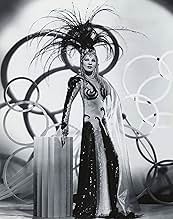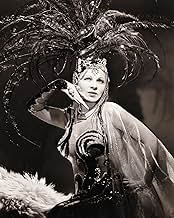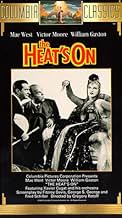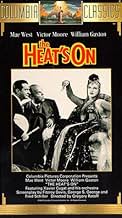Aggiungi una trama nella tua linguaWhen his biggest star joins a rival's show, a Broadway producer bluffs and schemes to get her back.When his biggest star joins a rival's show, a Broadway producer bluffs and schemes to get her back.When his biggest star joins a rival's show, a Broadway producer bluffs and schemes to get her back.
- Regia
- Sceneggiatura
- Star
Leon Belasco
- Shore - the Agent
- (non citato nei titoli originali)
Beatrice Blinn
- Babette
- (non citato nei titoli originali)
Recensioni in evidenza
5tavm
Well, after 40 years of reading about this movie, my curiosity has finally been settled! Her last movie before this one-My Little Chickadee-having been released three years previous, Mae West makes one more picture before taking a 27-year sabbatical from Hollywood. However, because she didn't write her material like before, she doesn't have much witty lines and in fact, has small screen time despite her above-the-title billing which she shared with William Gaxton and Victor Moore, both of whom have more scenes. It's with Moore that Ms. West has her one good scene with as she manages to get him drunk while he reveals the crux of the plot. Otherwise, this film is just an excuse to provide musical numbers of either Mae, Xavier Cugat and his Orchestra, or the excellent singing and piano skills of Hazel Scott and excellent Ms. Scott really is! If anyone makes this picture worth seeing, she does! P.S. Lloyd Bridges has a small role as a soldier who visits his girlfriend played by Mary Roche who's only appearance on film this was.
At 49, Mae West appeared in this bagatelle produced and directed by her friend, Gregory Ratoff, who needed a name actor to justify the production, but the main character is a hapless bumpkin, well played by Victor Young. Nearly three decades passed before she appeared in another movie. Even more odd was the brief career, as an actress, of pretty, charming Mary Roche, who played Young's niece, although she went on to work as a hair stylist on eight features, three of them very important ones, beginning with "On the Waterfront" (1954). This story of an attempt to put on a Broadway show goes in one ear and out the other, except for Xavier Cugat and his orchestra and the amazing piano playing of Hazel Scott, who even plays two pianos at once.
An attempt to remake a wartime musical in the old Busby Berkeley style. But Mae West was 50 years old and barely moves or sings; her sharp tongue has also seen better days. Better still is Victor Moore, who, despite his 67 years old, is much more entertaining and active than the popular diva.
The other saving graces are the appearances of singers Joana Thorsen and especially Hazel Scott, not to mention the participation of Xavier Cugat and, above all, his Cuban jazz orchestra, giving the film a picturesque touch.
A weak script, a lightweight, low-budget production, far from the extravagances of Busby Berkeley, this film is mere cheap entertainment, meant to distract viewers during the difficult times of war.
Also noteworthy is the appearance of a young Lloyd Bridges, in a supporting role.
The other saving graces are the appearances of singers Joana Thorsen and especially Hazel Scott, not to mention the participation of Xavier Cugat and, above all, his Cuban jazz orchestra, giving the film a picturesque touch.
A weak script, a lightweight, low-budget production, far from the extravagances of Busby Berkeley, this film is mere cheap entertainment, meant to distract viewers during the difficult times of war.
Also noteworthy is the appearance of a young Lloyd Bridges, in a supporting role.
It took three credited screenwriters to come up with this flaccid comedy-musical from Columbia--and not one of them apparently had a sense of humor. Perhaps taking a page from Mae West's real-life tangles with the censors, the bawdy, naughty comedienne is toned way down here in a plot about a musical stage performer who finds herself stuck in a bomb and blames her manager; he gets a bright idea and has the show raided for indecency to drum up business, but the gag goes too far and the show is closed for good. At this point, the foolish scenarists practically lose track of Mae, which is the most indecent thing about the picture! She pops up intermittently, talking on the phone or sitting idly in the theater, but all her charm and smarm has been extinguished (she retired from films for twenty-seven years after this). The manager weasels show money out of a good-natured schnook and puts on a new revue (a nice wholesome one)--and even gets West back in the spotlight--but it's too late. The movie has collapsed around everyone like an exhausted house of cards. *1/2 from ****
Turner Classic Movies just unearthed this turkey from their vaults and, being a fan of Mae West (though not an avid one), I thought I'd give it a whirl. Big mistake! (i.e., Big disaster!) After it had unspooled, TCM's host, Robert Osborne, revealed that producer-director Gregory Ratoff had somehow obtained Mae's signature on a contract to appear in this film without her seeing a completed script. When she did get an astonished look at what she was supposed to headline, she was "furious" according to Osborne, and promptly went to work rewriting most of her scenes, adding a few (but not enough) of her trademark witticisms.
The story is more than silly and takes little advantage of Miss West's star power, and, except for Hazel Scott's interpolated production numbers, there's almost no one else in the cast to match Mae's wattage. But she looks great, slinking around in Walter Plunkett's fancifully fantastic creations and Franz Planer's glossy black-and-white cinematography makes the most of the second-tier production values typical of a Columbia Pictures programmer.
Poor Victor Moore is required to portray a pathetic boob, intimidated by a battleaxe of a sister, quite effectively embodied by one Almira Sessions. The ingénue, played by Mary Roche, probably didn't elicit many wolf whistles when this dud was shown to the troops during WW II; Lloyd Bridges has a really small role as her swain (in uniform, of course); and there's an actor named Lester Allen, playing a character appropriately called Mouse Beller, who could only be cast in a role with that moniker.
Mae West quit performing before the cameras (going back to the stage and touring with her fabled nightclub act) and didn't make another picture until "Myra Breckenridge" in 1970 (and she was arguably the best thing in that crazy curiosity). This one is only for those fans who want to get a look at what Hollywood thought it could get away with during the wartime years.
The story is more than silly and takes little advantage of Miss West's star power, and, except for Hazel Scott's interpolated production numbers, there's almost no one else in the cast to match Mae's wattage. But she looks great, slinking around in Walter Plunkett's fancifully fantastic creations and Franz Planer's glossy black-and-white cinematography makes the most of the second-tier production values typical of a Columbia Pictures programmer.
Poor Victor Moore is required to portray a pathetic boob, intimidated by a battleaxe of a sister, quite effectively embodied by one Almira Sessions. The ingénue, played by Mary Roche, probably didn't elicit many wolf whistles when this dud was shown to the troops during WW II; Lloyd Bridges has a really small role as her swain (in uniform, of course); and there's an actor named Lester Allen, playing a character appropriately called Mouse Beller, who could only be cast in a role with that moniker.
Mae West quit performing before the cameras (going back to the stage and touring with her fabled nightclub act) and didn't make another picture until "Myra Breckenridge" in 1970 (and she was arguably the best thing in that crazy curiosity). This one is only for those fans who want to get a look at what Hollywood thought it could get away with during the wartime years.
Lo sapevi?
- QuizThis was Mae West's final film until Il caso Myra Breckinridge (1970) 27 years later.
- BlooperOn a wall of a producer's office is a presumably old publicity shot of Fay wearing an elaborate headdress that she doesn't actually wear until she performs a musical number later in film for an entirely new production staged by rival producer.
- Citazioni
Fay Lawrence: [singing] If you want things put in order, Come and see me south of the border...
- Colonne sonoreI'm Just a Stranger in Town
(1943)
Music by Jay Gorney
Lyrics by Henry Myers and Edward Eliscu
Copyright 1944 by Mills Music Inc.
Performed by Mae West (uncredited) in the show "Indiscretions"
I più visti
Accedi per valutare e creare un elenco di titoli salvati per ottenere consigli personalizzati
Dettagli
- Data di uscita
- Paese di origine
- Lingue
- Celebre anche come
- Sinfonías dislocadas
- Azienda produttrice
- Vedi altri crediti dell’azienda su IMDbPro
- Tempo di esecuzione
- 1h 19min(79 min)
- Colore
- Proporzioni
- 1.37 : 1
Contribuisci a questa pagina
Suggerisci una modifica o aggiungi i contenuti mancanti



































